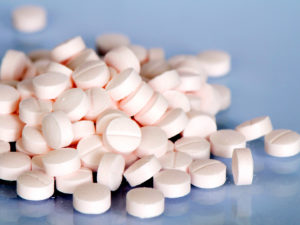
Credit: drweil.com
New research suggests that the risk for the most common type of breast cancer is reduced by 20 percent in women who take low-dose, or “baby” aspirin at least three times a week. A study published Monday in the journal Breast Cancer Research used data from more than 57,000 women who participated in the California Teachers Study.
In 2005, those 57,000 participants answered questions about their use of aspirin and other medications. Researchers also gathered data about their family history of cancer, use of hormone therapy, alcohol use, exercise, height and weight. In the 23 percent of women who reported taking low-dose aspirin regularly, the risk of developing HR-positive/HER2 negative breast cancer was reduced by 20 percent.

Credit: turmericforhealth
The study did not examine the reason there might be an association between lower cancer risk and aspirin. But Leslie Bernstein, a professor at the City of Hope Cancer Center in Duarte, California, and senior author of the study, said it could be attributed to aspirin’s role in reducing inflammation. She also says research shows that aspirin is an aromatase inhibitor. That is, it slows the production of estrogen, which can stimulate the growth of hormone-receptor-positive breast cancer cells.
Bernstein says that the benefit of aspirin is “maybe not as good as exercise.” But she thinks that more people might be likely to actually adhere to an aspirin regimen rather than an exercise regimen. Bernstein also cautions that it’s too early for doctors to start recommending aspirin for breast-cancer risk reduction. She notes that the study is merely observational, so it does not establish a direct cause-and-effect relationship. However, she also says, “On the other hand, large observational studies sometimes are able to detect effects in some groups or for more rare outcomes that trials are not empowered to see, so the studies are still valuable.”

 New Study Suggests Low-Dose Aspirin Reduces Breast Cancer Risk
New Study Suggests Low-Dose Aspirin Reduces Breast Cancer Risk



 The Healing Sound of Singing Bowls
The Healing Sound of Singing Bowls
 “Summons” by Aurora Levins Morales
“Summons” by Aurora Levins Morales














